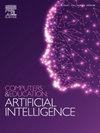How ChatGPT impacts student engagement from a systematic review and meta-analysis study
Q1 Social Sciences
Computers and Education Artificial Intelligence
Pub Date : 2025-01-02
DOI:10.1016/j.caeai.2025.100361
引用次数: 0
Abstract
Generative artificial intelligence, such as ChatGPT, has been increasingly integrated into education to change student learning experience. Current empirical studies have mixed results on how ChatGPT impacts student behavioral, cognitive, and emotional engagement. This systematic literature review and meta-analysis explores whether and how ChatGPT impacts student behavioral, cognitive, and emotional engagement. We used the PRISMA method to select, analyze, and report the results. We screened 766 articles from four databases and identified 17 empirical studies with 1735 students for analysis. We compared the effect on student engagement between ChatGPT-based and non-ChatGPT learning. We found a medium effect size on overall student engagement in ChatGPT-based learning in the random effects model. Our analyses further suggest that ChatGPT-based learning is more effective in fostering student behavioral (medium effective size), cognitive (large effective size), and emotional engagement (medium effective size) than non-ChatGPT learning. Our findings revealed ChatGPT is an effective tool for engaging students in learning. We also suggested three roles ChatGPT plays in fostering student engagement: personalized tutoring, programming and technical assistance, and content generation and collaboration. Our systematic literature review revealed potential risks and results in student disengagement, such as over-reliance.
求助全文
约1分钟内获得全文
求助全文
来源期刊

Computers and Education Artificial Intelligence
Social Sciences-Education
CiteScore
16.80
自引率
0.00%
发文量
66
审稿时长
50 days
 求助内容:
求助内容: 应助结果提醒方式:
应助结果提醒方式:


